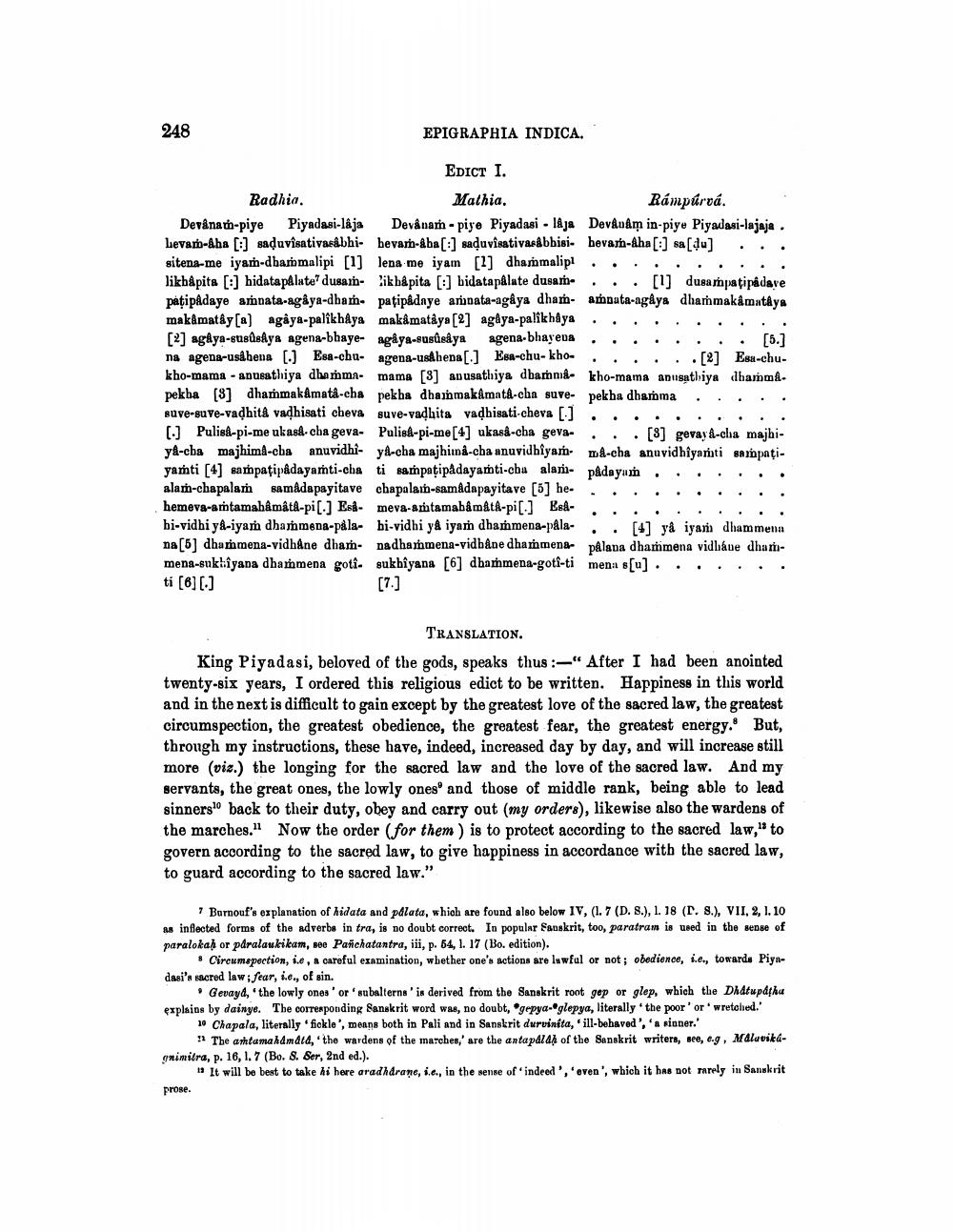________________
248
EPIGRAPHIA INDICA.
EDICT I.
Radhia. Mathia.
Rámpúrvá. Devånarn-piye Piyadasi-låja Devånam - piye Piyadasi - ldja Devavam in-piye Piyalasi-lajaja. Levan-Aha [:saduvîsativasábhi- bevar-Aba[:] sadu visativasábbisi- bevam-aha[:] sa[du] . . . sitena-me iyam-dhammalipi [1] lena me iyam [2] dhammalipl . . . . . . . . . . likbåpita [:] hidatapdlate" dusam- likhápita (:) bidatapâlate dusam. . ..[1] dusampaţipâdave pátipAdaye anata-agaya-dham- patipadaye annata-agâya dham- amputa-agaya dharmakamataya makamatay(a) agaya-palikhaya makamataya [2] agaya-palikhaya . . . . . . . . . . [2] agaya-gusûsaya agena-bhaye- agåya-susûsâya agena-bhayeva . . . . . . . . [5.] na agena-usábena (.) Esa-chu- agena-uskhena[.] Esa-chu-kho- . . .. [] Esa-chukho-mama-anusathiya dhamma. mama [3] anusathiya dhamma kho-mama anisathiya dhamma. pekba (8] dhammakámata-cha pekha dhainmakámata-cha suve- pekha dhamma . . . . . BUV-suve-vadhita vadhisati cheva suve-vadhita vadhisati-cheva [.] . . . . . . . . . . 6) Pulish-pi-me ukas& cha geva- Pulisch-pi-me[4] ukasa-cha geva- .. . [8] gevaya-cha majbiya-cha majhimd-cba anuvidhi-ya-cha majhima-cha anuvidhiyam.ml-cha anuvidhiyariti sampațiyanti [4] sampaţipâdayarti-cha ti sampaţipâdayanti-cha alarii- padaya . . . . . . . alam-chapalam samádapayitave chapalam-samAdapayitave (5] he.. . . . . . .. . . hemeva-amtamahâmâta-pic.] Es- meva-amtamabåmata-pic.] Esd-... . . . . . . bi-vidbi y&-iyam dhammena-påla- bi-vidbi ya iyam dhanmena-påla- .. [4] ya iyan dhammena na[6] dharmena-vidhane dham- nadhammena-vidbåne dhammens- palana dharmena vidhave dhura mena-sukliyana dharmena gotî. sukhîyana [6] dbammena-gotî-ti mena s[u] ....... ti (60)
TRANSLATION. King Piyadasi, beloved of the gods, speaks thus :-" After I had been anointed twenty-six years, I ordered this religious edict to be written. Happiness in this world and in the next is difficult to gain except by the greatest love of the sacred law, the greatest circumspection, the greatest obedience, the greatest fear, the greatest energy. But, through my instructions, these have, indeed, increased day by day, and will increase still more (viz.) the longing for the sacred law and the love of the sacred law. And my servants, the great ones, the lowly ones and those of middle rank, being able to lead sinnerslo back to their duty, obey and carry out my orders), likewise also the wardens of the marches. Now the order for them ) is to protect according to the sacred law," to govern according to the sacred law, to give happiness in accordance with the sacred law, to guard according to the sacred law.”
7 Burnouf's explanation of hidata and palata, which are found also below IV, (1.7 (D. S.), 1. 18 (C. S.), VII, 2, 1.10 as inflected forms of the adverbs in tra, is no doubt correct. In popular Sanskrit, too, paratram is used in the sense of paralokah or pdralaukikam, see Panchatantra, iii, p. 64, 1. 17 (Bo. edition).
. Circumspection, ie, a careful examination, whether one's actions are lawful or not; obedience, i.e., towards Piyadasi's sacred law; fear, t.e., of sin.
• Gevayd, the lowly ones' or ' subalterna' is derived from the Sanskrit root gop or glop, which the Dhdtupathu explains by dainye. The corresponding Sanskrit word was, no doubt, gepya-glepya, literally the poor' or 'wretched.'
19 Chapala, literally "fickle', means both in Pali and in Sanskrit durvinita, 'ill-behaved,' sioner.'
11 The antamahdmata, the wardens of the matches,' are the antapdian of the Sanskrit writers, see, e.g, Maluvikgnimilra, p. 16, 1.7 (Bo. 8. Ser, 2nd ed.).
11 It will be best to take hi here aradhdrane, ie, in the sense of indeed','aven, which it has not rarely in Sanskrit prose.




